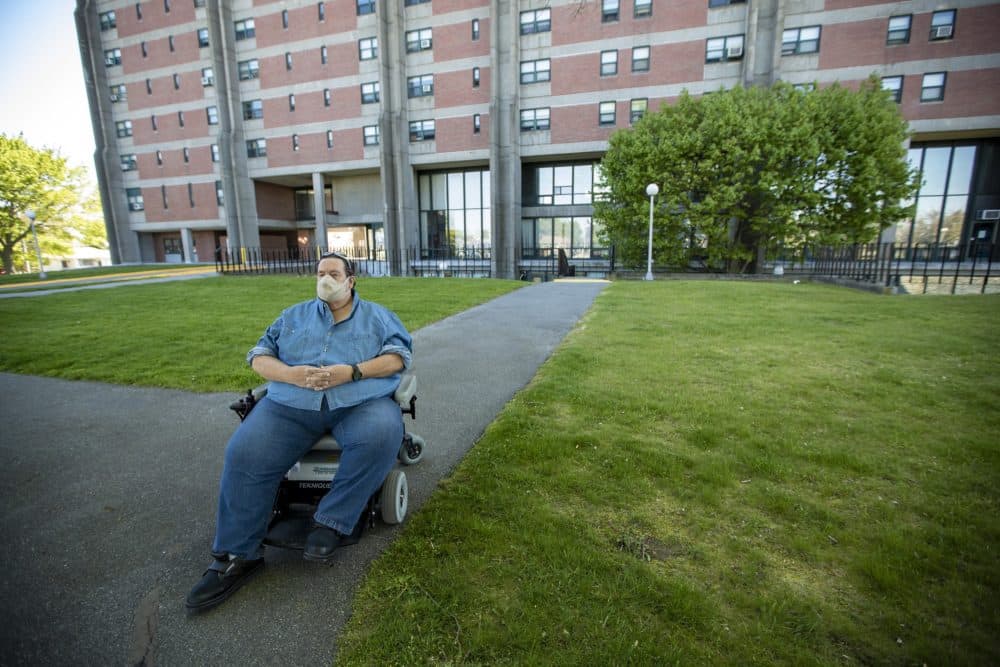Advertisement
As State Reopens, Public Housing Remains Vulnerable To COVID-19

A few weeks ago, Susan Bonner noticed some new signs in her building, urging residents to wear masks. Not a bad idea, she thought. "Except that we didn’t all have masks, yet, at that time," she recalls.
Bonner, who is 78, lives in a senior public housing development in Nahant; she's also one of town's housing commissioners. Eventually, she says, residents in her building all got masks — but it took some doing.
"Some people got a number of them and gave them out," Bonner says. "And then the housing authority went next door to the police station and was given enough for the rest of the [residents] in the senior building."
This is what it has been like for Massachusetts public housing authorities since the lockdown began: even small things, like getting masks, demands ingenuity. And that ingenuity has been fueled by urgency. Two-thirds of the state's public housing residents are seniors or people with disabilities, and many are essential workers — all groups that are especially vulnerable to the virus.
Massachusetts' own data bears this out: 85% of coronavirus deaths in the state have been in people 70 years or older. Some of the biggest outbreaks have been in nursing homes and assisted living facilities. But far less attention has been paid to the state’s public housing residents.
Massachusetts' 200-plus public housing authorities are an eclectic mix, with everything from high-rises to houses, and are funded by a mishmash of federal and state aid. Some of the smallest housing authorities don't even have full-time staff.
"My biggest worry is that we end up with a cluster somewhere," says Colleen Doherty, director of the Taunton and Stoughton Housing Authorities. "And that we end up with it in an elderly site or a congregate building — somewhere that it could spread fairly quickly."
So far, that hasn't happened. Doherty knows of only 12 cases and two deaths among her approximately 1,200 residents. And as of May 13, there were fewer than 400 known coronavirus cases across the state’s roughly 83,000 public housing units.
But that number may be an underestimate. The state has not targeted public housing in its expansion of mobile testing, and instead relies on local housing authorities to report cases. Some are aided by local health departments to gather data, and Cambridge recently announced a mobile testing program aimed at senior public housing residents. But many local housing authorities depend on residents to self-report.
Advertisement
"We call our residents every week to kind of say, 'How are you feeling?' " Doherty says. "And some will say to us, you know, 'I've tested positive,' or 'I'm going to get a test. I don't feel good.' "
Still, Doherty has been pleased with the state's response. The state Department of Housing and Community Development meets weekly with local housing authorities to advise them on best practices. Across the state's public housing developments, community gathering spaces are closed, visitors are limited and residents are isolating.
Isolation in particular can be difficult for people who can’t afford to stockpile supplies. Doherty remembers getting a call from an older resident who had run out of toilet paper. "He was so uncomfortable because he didn't have toilet paper, was using other things," she says. "It's like, what is this? Where are we? You don't even feel, for a minute, like you're in America."
Despite supply shortages and a vulnerable population, public housing authorities like Doherty's seem to have kept the virus at bay. But she reckons they’ve spent over $100,000 just on overtime. Housing authorities have had to dip into their reserves to cover these types of costs, and it has taken a toll.
"Housing authority budgets are very lean," says Jack Cooper, executive director of the Massachusetts Union of Public Housing Tenants. He says state-subsidized authorities have been especially hard-hit, because they aren't eligible for federal CARES Act funds.
Many housing authorities couldn't meet the state and federal requirements for deep cleaning and sanitizing, Cooper says: "They couldn't afford that because they don't have that much excess budget."
Earlier this month, Cooper signed onto a letter sent to the state and federal legislatures requesting $15 million for local housing authorities. Last week, the governor filed a $1 billion supplemental budget bill that includes the requested aid, though it still needs legislative approval.
Now, as Massachusetts businesses open up and residents start to leave their homes, public housing authorities are faced with the prospect of more community spread. They've been fortunate so far. But as the lockdown eases, they may need to be more vigilant than ever.
"I understand, you know, people need to get back to work," Doherty says. "But for us, if I could put a bubble around my elderly sites, I would."
This segment aired on May 22, 2020.
